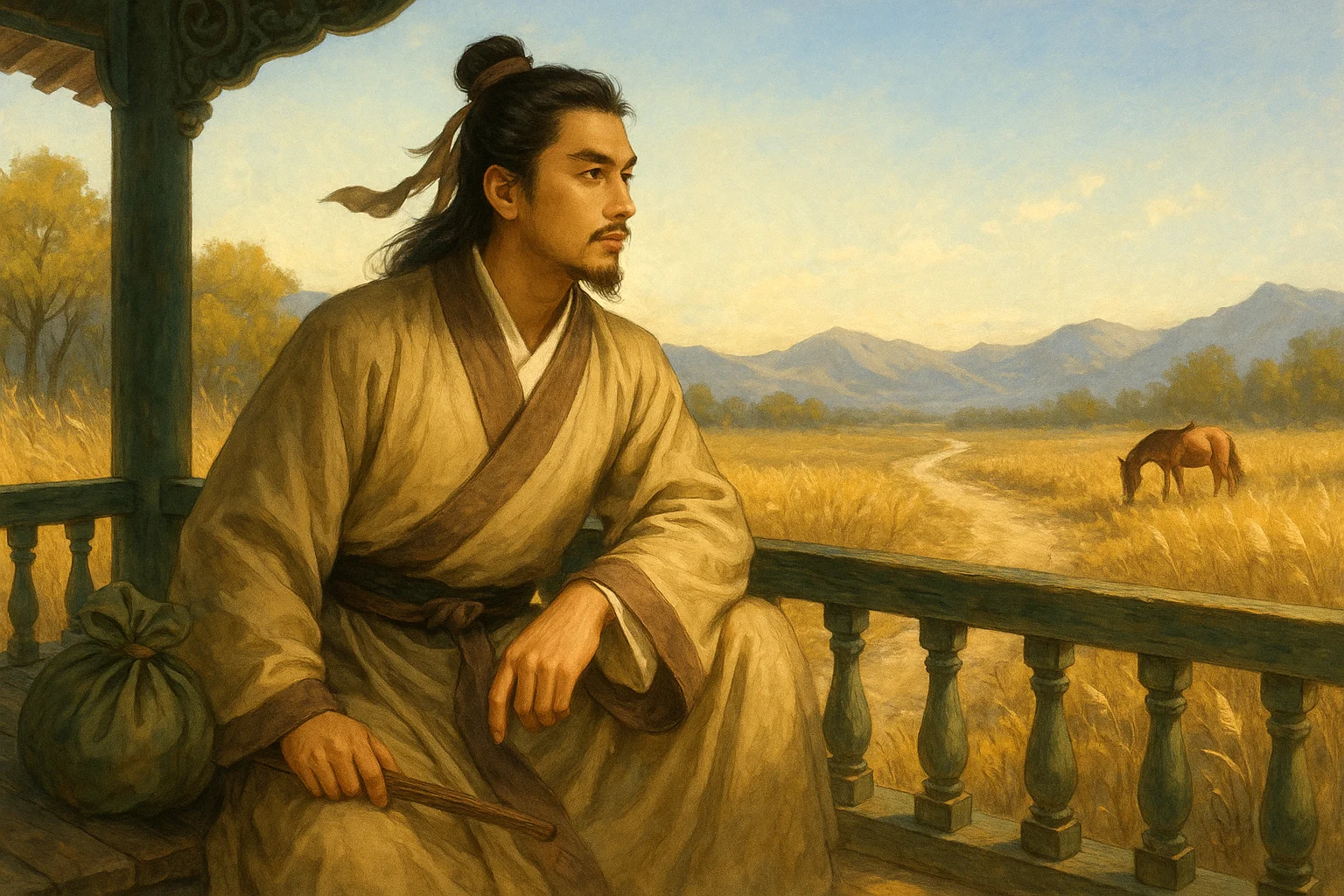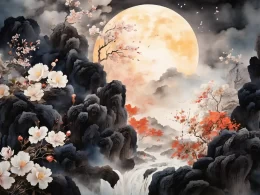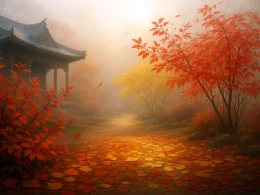Spring sun stirs the greening grass,
Slow I roam by the marsh, alone.
With wild butterflies, flowers I chase,
More than gulls love waves, I love this place.
Beyond this flesh—only wine’s embrace,
All the world’s grief is my own.
Who’d guess the jade-chime minister,
Envies not the melon-seller?
Original Poem
「独游寄卫长林」
司空曙
草绿春阳动,迟迟泽畔游。
恋花同野蝶,爱水剧江鸥。
身外唯须醉,人间尽是愁。
那知鸣玉者,不羡卖瓜侯。
Interpretation
This quintessential five-character regulated verse by Tang poet Sikong Shu was likely composed during his travels through Jiangnan, a period of wandering and existential contemplation. Addressed to his friend Wei Changlin—perhaps a colleague or kindred spirit—the poem transforms a solitary spring outing into a meditation on reclusion. Through images of sunlit grass, wild butterflies, and river gulls, the poet cultivates a pastoral serenity that subtly rejects worldly ambition. The work exemplifies Sikong Shu's signature blend of understated landscape poetry and philosophical detachment.
First Couplet: "草绿春阳动,迟迟泽畔游。"
Cǎo lǜ chūn yáng dòng, chíchí zé pàn yóu.
Spring sun stirs the emerald grass— / By marshy shores, I wander without haste.
The opening establishes a leisurely rhythm, painting vernal tranquility with economical strokes. "Wander without haste" (迟迟游) sets the tone of purposeless meandering, framing nature as an antidote to human urgency.
Second Couplet: "恋花同野蝶,爱水剧江鸥。"
Liàn huā tóng yě dié, ài shuǐ jù jiāng ōu.
I adore blossoms like wild butterflies; / My love for water rivals gulls' delight.
Here, the poet dissolves into the ecosystem—his passions mirrored in creatures embodying untrammeled freedom. The parallel structure ("like…rivals…") merges observer and observed, suggesting harmony beyond societal constraints.
Third Couplet: "身外唯须醉,人间尽是愁。"
Shēn wài wéi xū zuì, rénjiān jìn shì chóu.
Beyond this self, only drunkenness matters; / The human world? Sheer sorrow.
A volta sharpens the poem's edge: pastoral joy reveals its defensive purpose. "Drunkenness" symbolizes not escapism but recalibration—prioritizing elemental joys over civilization's discontents. The stark contrast ("only…sheer…") underscores his existential choice.
Fourth Couplet: "那知鸣玉者,不羡卖瓜侯。"
Nǎ zhī míng yù zhě, bù xiàn mài guā hóu.
How could those jade-clad nobles know— / I scorn even the melon-selling duke?
The closing couplet deploys historical allusion: "melon-selling duke" references Han-dynasty satirist Dongfang Shuo, who parodied bureaucratic advancement. By rejecting both aristocrats ("jade-clad") and upstarts, the poet affirms values untethered from social hierarchies.
Holistic Appreciation
This exquisite dedicatory poem exemplifies the refined tradition of expressing noble aspirations through contemplative wandering. Eschewing dramatic narratives or turbulent emotions, it delicately frames a scholar's serene existence amidst nature's tranquility, using the soft palette of spring as its backdrop. The opening couplet unfolds with painterly grace—emerald grasses awakening to spring's touch, unhurried promenades along the marsh—establishing an atmosphere of crystalline purity and poetic distance. The second couplet employs twin metaphors of "wild butterflies" and "river gulls" to reveal the poet's harmonious yet vibrant inner landscape. A graceful transition in the third couplet contemplates human sorrows and the enlightened joy of inebriation, presenting life through the prism of philosophical detachment. The concluding lines artfully counter worldly ambitions with elegant irony, celebrating spiritual autonomy and intellectual self-sufficiency.
The composition honors the distinguished legacy of High Tang recluse poetry—embodied by masters like Meng Haoran and Wei Yingwu—where natural imagery and limpid diction convey transcendental serenity. While Sikong Shu's verse consistently communes with nature, it distinguishes itself through its elegant fusion of pastoral beauty with thoughtful self-reflection, as masterfully demonstrated herein.
Artistic Merits
- Lyrical Freshness, Crystalline Clarity:
The language achieves sublime simplicity through exquisite diction and balanced cadence, radiating an effortless sophistication free from artifice. - Scenic Emotionalism, Poetic Symbiosis:
Each natural element—from spring foliage to fluttering butterflies—transcends mere description to become vessels for the poet's philosophical contemplations and pastoral delights. - Epigrammatic Finale, Allusive Depth:
The "melon-selling noble" reference embodies the poet's erudition, simultaneously critiquing officialdom's caprices and affirming principled detachment with graceful wit.
Insights
This poetic gem offers more than a scholar's springtime reverie—it embodies the cultivated mindset of one who views worldly honors and setbacks with equanimity. The ancient literati ideal of maintaining intellectual independence through communion with nature and cultural refinement finds perfect expression in these lines. By likening this philosophical lifestyle to "butterflies dancing among blossoms" and "gulls skimming tranquil waters," the poet creates an enduring vision of harmonious existence that continues to inspire our pursuit of balance and self-realization in modern life.
About the poet

Sikong Shu (司空曙), c. 720 – c. 790, courtesy name Wenming, was a native of Guangping (present-day Yongnian County, Hebei Province). A renowned mid-Tang dynasty poet, he was one of the "Ten Literary Masters of the Dali Era," alongside Lu Lun, Qian Qi, Han Hong, Li Duan, and others. Though his life lacked illustrious achievements, his poetry—marked by genuine emotion in simplicity and profound contemplation in solitude—secured him a unique place in mid-Tang literary circles.












